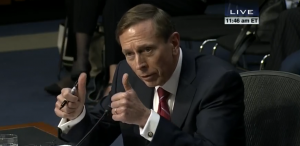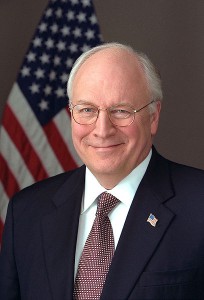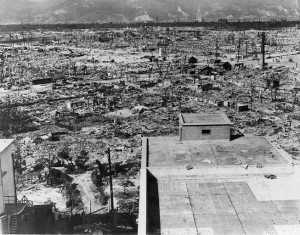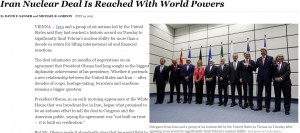“It’s Good to Be Back,” Petraeus Says before He Offers a Vague Apology and Oil Market Advice
 John McCain has officially launched David Petraeus’ rehabilitation tour.
John McCain has officially launched David Petraeus’ rehabilitation tour.
Petraeus testified today before the Senate Armed Services Committee on what to do in the Middle East. But you could tell how much this is about rehabilitation for the heartfelt thanks Petraeus offered McCain for bringing him in to testify. “It’s good to be back,” Petraeus said, before launching into the most hailed part of the hearing, this vague apology.
I think it is appropriate to begin my remarks this morning with an apology, one that I have offered before, but nonetheless one that I want to repeat to you and to the American public. Four years ago I made a serious mistake, one that brought discredit on me and pain closest–to those closest to me. It was a violation of the trust placed in me, and a breach of the values to which I had been committed throughout my life. There’s nothing I can do to undo what I did. I can only say again how sorry I am to thoseI let down and then strive to go forward with a greater sense of humility and purpose, and with gratitude to those who stood with me during a very difficult chapter in my life.
He didn’t actually say what part of the scandal he was apologizing for, though some of the press seemed to be certain that it was about one or another aspect of it. His invocation of the pain he caused those closest to him suggests it was the affair itself. The timing — just over four years ago, August 28, 2011, was the day he gave his black books full of code word intelligence to Paula Broadwell for several days — suggests it was about actually leaking intelligence.
If the acts he apologized for were four years ago, though, it means this apology doesn’t cover the lies he told the FBI on June 12, 2012 about sharing this intelligence. And it doesn’t cover keeping those books with code word intelligence in the top drawer of his unlocked desk until FBI found them on April 5, 2013, the act — mishandling classified information — that he technically pled guilty too.
Though I wouldn’t be surprised if the lawyer he shares with Hillary Clinton, David Kendall, advised him not to apologize for lying to the FBI, given that would involve admitting guilt for something he didn’t plead guilty for.
So having apparently apologized for a range of things that didn’t apparently include lying to the FBI, David Petraeus gave unsworn testimony to Congress.
The testimony was about what you’d expect. David Petraeus’ surge was, according to David Petraeus, a huge success. Petraeus told of some great things Nuri al-Maliki did even while explaining some great things Haider al-Abadi is doing. Petraeus envisioned the break up of Syria while insisting that the same couldn’t happen in Iraq (because the Sunnis in Iraq would have no oil revenues). All casualties in Syria were the fault of Bashar al-Assad, and not the US ally-backed forces Petraeus watched get armed while he was still CIA Director. Petraeus denied, without being asked, that the military had a policy of ignoring Afghan bacha bazi, as reported in NYT this week.
Not a word was mentioned about the chaos CIA-led intervention in Libya has caused, or what to do about it (Petraeus did mention Libya in a passing answer to a question), not even in discussions of why the Russians would never be willing to work under US command in countering ISIS, not even from the party that remains obsessed about Benghazi.
Nothing was mentioned about how all the men we’ve — Petraeus — has trained have been prone to flee.
The closest Petraeus came to discussing the support for Sunni extremism our allies — Qatar, Saudi Arabia, and Turkey — give (and therefore their role in the region’s instability) came when Petraeus discussed Turkey’s increasing targeting of PKK that happened at the same time Turkey agreed to let us use Incirlik Air Base, though Petraeus didn’t note any connection between those two things.
Perhaps the most interesting part of the hearing, though, came towards the end (after 2:11), when Thom Tillis asked a very reasonable question about how other countries (he didn’t say, but he probably had China in mind) reliance on Iran once they start selling oil will become important strategically.
After claiming Tillis’ break-even number for Iran’s budget (which accords with public reporting) was incorrect, Petraeus put on his private equity guy hat.
I’m the chairman of the KKR global institute and a partner in KKR, one of the global investment firms, uh [hand gesture showing breadth] big private equity firms in our country. And, first of all, by the way, the analysis on crude oil export shows that not only would the price of WTI, West Texas Intermediate go up slightly, so the producers would be better off, it would also have an impact on Brent Crude prices, which would come down, the global price, which is a lot of what we refine, and the price at the pump probably would go down. So it’s very interesting — if you look at, I think it’s the CBO that did the analysis of this. One of our analytical organizations here, I think, on Capitol Hill has looked at this. And it’s a very interesting dynamic.
[Tillis tries to interrupt, Petraeus keeps speaking.]
Beyond that, I don’t think we should get involved in markets as a country, unless we want to do something like sanctions. So again, you wouldn’t do it — if you want to use sanctions for economic tools as a weapon, gives thumbs up sign] fine, but otherwise I think you have to be very careful about intervention in the global markets.
Tillis tried again, restating his question about whether we should drill as much oil as we can to hedge against increased Iranian influence.
We ought to produce all the oil that we can, if we’re making a profit. If we can enable countries like Iraq to revive their oil industry as we did, it helps Iraq, it funds their gover–by the way they’re running into fiscal deficit now. But again, this is really about market forces I think, much more than getting involved in this as a country.
Not much of Petraeus’ answer made sense, but I can assure you, the head of KKR’s Global Institute is pretty excited about natural gas.
Sure, the expertise of a private equity guy might be worthwhile to Congress, though that affiliation was not listed on the SASC website. 
But it’s all the more absurd given the rest of Petraeus testimony, most notably his silence about Saudi Arabia’s destabilizing influence, given that we do play in global markets precisely through our unquestioningly loyalty to the Saudis.
I guess the Senate — which turned out in big numbers — finds this kind of analysis useful. But it is, once again, about David Petraeus more than it is about testimony that will help us adopt a sound policy in the Middle East.






